“Inspire 2018 enables designers and engineers to leverage Simulation in new and inventive ways to accelerate the development of high-performance, innovative products,” says James Dagg, CTO for User Experience at Altair. “Inspire integrates well into large manufacturing enterprises for rapid Simulation and lightweighting insights, and has an intuitive user experience that is ideal for small and medium-size businesses with little or no Simulation experience.”
 Structural simulation of mixed solid and lattice optimization results. Image courtesy of Altair.
Structural simulation of mixed solid and lattice optimization results. Image courtesy of Altair.Applied at the beginning of clean-sheet design programs and for design exploration of current production parts, Inspire Simulation-driven design software allows designers and engineers to:
- rapidly assemble and simulate dynamic mechanical systems to automatically resolve loads on system components for optimization and analysis;
- generate weight-efficient design proposals unique to specified conventional or additive manufacturing processes with Altair’s topology optimization technology;
- simulate the performance of competing design concepts for static loads, normal modes and buckling and
- directly export Inspire CAD geometry to 3D printers to produce quality parts.
Inspire 2018 includes new advancements to:
- generate optimized lattice and mixed solid - lattice structures, visualize Simulation results in 3D, and export lattice designs in .stl file format for 3D printing;
- view and interactively assign loads to load cases and import / export design loads in .csv file format with the new Load Cases Table;
- design for additive manufacturing with overhang shape controls to help reduce overhangs to create more self-supporting structures and
- automatically optimize the fit of PolyNURBS CAD geometry to generative design results with the new PolyNURBS Fit Tool.
“Inspire 2018 is available immediately to clients as an application software download and later this year as a cloud-based offering,” says Dagg. “Branded as Inspire Unlimited, the cloud offering of Inspire will include additional functionality such as secure data management, team collaboration tools and on-demand high-performance computing (HPC).”
For more info, visit Altair.
Sources: Press materials received from the company.







